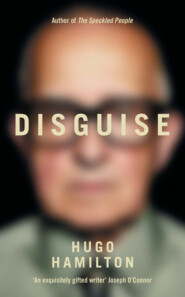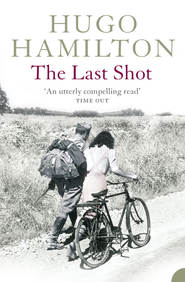По всем вопросам обращайтесь на: info@litportal.ru
(©) 2003-2024.
✖
The Sailor in the Wardrobe
Настройки чтения
Размер шрифта
Высота строк
Поля
Some of the boys came up to see what was happening. They had lost interest in the fire which was almost gone out by now.
‘Look, it’s Eichmann,’ one of them said.
They had turned against me. They no longer saw me as a hero who had done something to defend the big fire. It was a mistake to have even tried getting in with them, because they were on the side of the fireman now, staring at me through the bars, waiting to see what would happen. All I could think of doing was to chop at the fireman’s hand and release myself from his grip.
‘Get him,’ the fireman shouted, and some of the men outside the railings began to converge on me. One of them with a red face threw down his cigarette and stepped into my way. I dodged him, but he came after me until he started coughing and stood still. I felt their hands on me, but I managed to twist and pull away from them each time, even when they put a foot out to trip me. Another man came after me, but the change in his pockets started falling out and rolling towards the gutter, with him cursing and calling me a whore and bending down to pick up his money.
I was afraid to run further into the terraces. I tried to turn back, but some of the boys had begun to come through the gap in the fence.
‘It’s Eichmann,’ they were shouting. ‘After him.’
I was running down their streets. Rockets were going off all around me. Children staring at me through their masks. Women standing outside their houses smoking and talking, watching me running past with my shirt and my jumper torn. Some of the doors were wide open and you could see right into the front rooms where the television was on. I thought the women were going to get out the dustbin lids and start banging. One of the women was laughing or coughing, I didn’t know which, and a terrier dog ran out barking and chasing after me because he knew I didn’t belong to that street.
Then I remembered how this happened to my mother, a long time ago, when she was small. She told me how the Kaiser girls played on the Buttermarkt Square in Kempen, right in front of their house, and sometimes they clogged up the fountain with paper from their father’s stationery shop and the water swept all across the square and the town warden complained to their father. The town warden even chased them into the house one day. But instead of protecting them, their grandmother let him right into the house to teach them a lesson that would put an end to the complaints. My mother was the only one who ran out the back door and into the streets again, while the other girls were all caught in the hallway by the warden and their grandmother, facing punishment. My mother ran through the streets of the town all afternoon, around by the Burg, by the windmill, running and running, thinking that the warden was after her all the time. Even when it got dark she was still afraid to go home. But then she was even more afraid of being left out all night, so she decided to give herself up. When she got home at last, sneaking up silently to her own house, the warden was gone, but she had to explain to her father why she had come home so late after everyone had eaten their dinner and the table was already cleared. So then she told him about the town warden chasing them into the house and how she was the only one who wasn’t caught. She expected her father to be angry, but he smiled. He put her on his knee and stroked her head until she was not so afraid any more.
Now it’s me running away, just like my mother. Now it’s the fireman and all the other bonfire boys coming after me through the streets. The fireman must have got out through the park gate because I saw him following me all the way with the boys ahead of him, running hard and catching up fast. Further back, some of the men were following, too, and I was afraid the whole city was after me. I was afraid the women would try to bar my way and that nobody would tell the fireman to have mercy on me.
At the end of the street I didn’t know which way to turn, so I climbed up onto the roof of a parked car and from there onto a wall that had some glass shards sticking out of the top. I could see nothing below me on the far side. I couldn’t even see how deep it was. It was black down there and no matter how much I stared down, waiting for my eyes to get used to the dark, I was blind and afraid to jump. I held my hands out in front of me as if that would help me find out what was down there on the other side, desperately searching for a safe place to land. I had no idea what I was going to jump into and thought I would be impaled on spikes. I thought of vicious dogs. I thought my chin would hit a tree stump or an upturned wheelbarrow. I thought maybe there was nothing down there at all and that I would just keep falling without ever reaching the ground.
I waited on the top of the wall until they caught up with me and I could see them below on the pavement. Some of them were already getting up on the car. The fireman was reaching his arm up along the wall to try and drag me back down again. So I jumped into the unknown. I threw myself into the darkness and kept falling down, down, for ever into the dark until I disappeared.
Six (#ulink_d40c47be-c499-5d54-b714-404a48d113eb)
After that I was afraid the fireman would turn up at the door of our house. If he couldn’t punish me himself, then he would try and get my father to punish me instead. I couldn’t sleep because I thought they would come and arrest me as a juvenile offender. I tried to work out what I would say, how I would lie to them and say it was dark and the fireman got it all wrong. It wasn’t me. They would call me a delinquent and ask me why I ran away if I was so innocent. The fireman would bring witnesses who would point at me and say: that’s him, Eichmann. But I would stare them all out and say it was a mistaken identity. Only my mother would be on my side and believe me.
Nobody came to the house. But that didn’t mean it was all forgotten. I knew they were still after me, so I had to go on the run, like Eichmann in Argentina. From then on, I had to avoid being seen on the streets. I had to become invisible and find ways of getting around without anyone noticing me. I drew up a map of detours through laneways and gardens. Instead of walking straight down to the seafront along the street, I started going around by the edge of the football field, across the disused farm, through the timber yard. I invented all kinds of complex escape routes around the neighbourhood, through building sites and derelict land. I got to know every foothold in the wall and every gap in the barbed wire.
I decided that I had to go underground. I had to pretend I didn’t exist any more. Nobody saw me going to school on the train in the morning. Nobody saw me coming home. Of course there was always a chance they might be waiting for me on one of my secret routes, that I would be trapped and put on trial again. Franz always thought it was safer to be out in the open where there were more adults around. But I trained myself to stay out of sight. Occasionally, somebody would spot me crawling for a few feet along the top of a wall. I would hear a shout or an angry knock on the window behind me, but I was always long gone before anyone took much notice. I would see people in their houses, in the kitchen with the lights on, sitting at the table with their backs to the window having their tea, people watching TV with blue faces, and me passing by outside like a gust of wind. I was living underwater now, running along the sea floor and breathing in silence.
Even at home, I became invisible. My mother said we’d always been doing strange and unusual things like putting stones in our ears when we were small, but this was one of the oddest things she had ever heard of and she hoped I wasn’t starting to lose my mind. She said I was going around the place like a ghost and one evening, when she called me to dinner, I didn’t go down the stairs but out through the window instead. I stepped past the beehives, climbed down onto the garden wall and came in through the back door. Then I sat down at the table without a word, as if I was totally out of sight. She even played along with it for a while, asking if anyone had seen me. But then she begged me to come back to life again because she was worried that I might disappear into myself. She waved her hand in front of my eyes and made faces at me until I had to laugh.
‘You can’t go underground in your own home,’ she said.
At the dinner table, I started speaking to myself in English. Every evening I looked at my father in front of me and I was having a big conversation inside my own head in the forbidden language. He must have known that I was breaking his rules, but there was nothing he could do to stop me speaking to myself in secret as if I had disappeared to a different country.
My mother said she understood why you sometimes have to become invisible. She remembers the time under the Nazis when Onkel Gerd, the Lord Mayor, had to disappear because he was silenced and they threw him out of office for not agreeing to join the party. First it was people like Onkel Gerd who were invisible, she says, but then it was the Jews who could not be seen anywhere on the streets in Germany. My father says the Irish also went underground against the British. He says they lost their language and now they’re all walking around like ghosts, following maps with invisible streets and invisible place names. He says the Irish are still in hiding in a foreign language. But one of these days they’ll come out and speak their own language again.
At night I stayed awake, thinking of more and more ways of getting around without being seen by anyone, imagining tunnels where I could actually move from place to place under the streets and come up through manholes. I imagined that I could vanish and live without ever touching the streets, without breathing. I imagined that if they ever caught me, I would vanish into thin air right in front of their eyes. I imagined clever things to say in English that would distract them and give me a chance to escape again. I thought about how I jumped off the wall into the darkness. I lay in bed and kept falling for ever. I thought my mother was falling as well. All my aunts and uncles in Germany falling down without ever reaching the ground, everybody in Germany just going down, down, down, without stopping. Until I started getting headaches all the time and I was no longer able to get up and go to school. All the invisible maps of the world were no good to me and the headaches got so bad that I just wished I could give myself up and get it over with.
When Eichmann was discovered living underground in Argentina, they were able to identify him by the injuries to his head which he suffered once in a motorbike accident, before he joined the SS. After being in hiding for so long, he was lonely and felt that anything was better than being invisible. When they walked up to him at a bus stop and identified him as Adolf Eichmann, the man who organized the transport of Jewish people to the concentration camps, he was probably shocked at first because it sounded like the worst insult in the world, the curse of his own name coming after him all these years later. He must have thought of denying it, but there was no point. Perhaps he was relieved to be himself again. He didn’t want to be imprisoned or executed, but he didn’t want the pain of being invisible either. People say that he was given a choice right there and then at the bus stop, whether he would prefer to be executed on the spot or travel to Jerusalem to be put on trial. So he agreed to go on trial because he wanted recognition. He was fed up being a nobody in Argentina. He didn’t own up to his guilt or ever say that he was remorseful. He didn’t admit to his crimes and said he was only doing his duty, trying to be as efficient as possible. He wanted to be famous for doing a great job, better than anyone else in the world had ever done before that. He wanted to stay alive for ever in history.
This time the doctors knew exactly what was wrong with me and called it Meningitis. I walked to the ambulance with a red blanket around my shoulders. My mother stood at the gate with her hand over her mouth, crying. She couldn’t come in the ambulance with me because she had to stay at home and look after the others. The neighbours were out as well and they were all worried because I was going to a place called Cherry Orchard and not everybody came back.
When I arrived at the hospital, there was no urgency at all at first. I had to lie in bed and wait, watching the man beside me smoking cigarettes and making a leather purse. He had a small radio on the locker beside his bed with lots of songs like ‘Summer Holiday’ coming back on again and again as if no time was going by at all. After about ten or fifteen summer holidays they brought me into the theatre and put me face-down on the operating table.
There were three of them holding me down and one of the nurses explained that Meningitis was a killer disease. They would have to stick a needle into my back in order to take some fluid from my spine. It had to be done without any anaesthetic, she explained, so they held my arms and legs and my head down, and I felt the needle going right into my back like a knife.
As soon as it touched my spine, I screamed. I screamed so much that they had to stop. I could be heard all over the hospital, but I didn’t care because the needle was so painful that I couldn’t help screaming each time, until they stopped. They were unable to find any fluid in my spine at first, so they had to keep trying in different places, until I was nearly fainting and the surgeon finally took off his mask because he was getting angry.
‘Do you think I’m trying to torture you?’ he said.
‘Please,’ I said. ‘It’s a mistake. I jumped down off the wall.’
I tried to explain that I must have banged my head and that’s why I was getting the headaches. It wasn’t Meningitis.
‘What’s he babbling about?’ the surgeon asked.
The nurses shook their heads. They must have thought I was getting delirious from Meningitis and that I no longer knew what I was saying. I tried to get off the operating table and had one leg hanging down with my foot nearly touching the floor, trying to escape. But they kept pushing me back up and finally they pinned every arm and leg down again.
‘Are we ready?’ the surgeon said.
This time they didn’t care what language I screamed in. One of the nurses said it would be over soon, but it went on for ever. They put the needle in again and again, until I was hoarse from crying. Eventually I felt their hands go soft and I knew they were letting me go. I heard the nurse saying that I was a free man. They brought me back to the ward and there was a piece of cake left on the bed along with a note from my mother, saying she was sorry that she missed me.
Then I was back watching the man smoking in his bed and not saying much, listening to more summer holidays for hours and hours, waiting for the results. They didn’t find any Meningitis and I was afraid they would have to do more tests. When my mother came to visit me again the next time, she stayed sitting on my bed for as long as she could. I begged her not to go and she stayed until the very last minute, until well after the bell rang and all the other visitors were gone.
‘Mein Schatz,’ she said. ‘You’ll be home soon.’
They found no evidence of Meningitis. It was like being declared innocent and my father came to collect me. He brought a bag with my clothes and it felt strange to be wearing shoes again. He was smiling a lot and speaking to me in Irish, saying I would notice a few changes in the house. I was like an emigrant returning home, dying to see if anything was still the same.
Everything was different. The house looked smaller than it did before. The street we live on seemed to have moved a bit further in from the sea and our back garden looked like it was squashed. The grass had grown. There were leaves on all the trees. My mother was wearing her navy blue dress with a white collar and I was like a visitor who had never been to our house before. Bríd and Ita were dressed up as nurses. Maria showed me the new washing machine, and the new green paint on the back door. Franz said the bees had swarmed while I was in hospital and nobody was at home to catch them or bring them back, so they got away. He said he came home from school one day and saw a big cloud of bees moving out over the gardens and over the roofs of the houses, so he ran up the road after them to see where they were going, until they went out of sight over the chestnut trees, across the railway tracks, and he couldn’t keep up with them any more. At dinner, Ciarán wanted to sit next to me. Everybody was looking at me and I was glad we were all in the same country again.
When the time came to execute Eichmann, they had to discuss what to do with his body afterwards. The court decided that he should be executed by hanging, but there were no instructions given about what to do with the remains. They didn’t want to burn the corpse in a crematorium, because that would have been too similar to what happened to his victims in Auschwitz. Neither did they want to bury him in Jerusalem, because they were afraid that his evil bones might contaminate the earth. It was never revealed and nobody knows what they finally did with Eichmann’s body, whether he remained on Israeli soil or whether he was secretly flown out to some other country like nuclear waste. Perhaps he has now gone to the same place as all his victims. There is no grave and no resting place and it looks like he’s become invisible again.
After that I tried to put all the things that happened to me out of my mind. I became the expert at forgetting. I developed a bad memory. I trained myself to go for weeks without remembering anything at all, but then it would come back again through my spine. There was an ache left over from the operation that wouldn’t go away. I could still feel it following me around even when I sat down or leaned back against a chair. If anyone touched me I would jump with the sensation of the needle going into my spine again. At night, I had to sleep with my back to the wall. In school I sat at the back of the class. On the bus, too, always the back seat. I even started walking home sideways, like a crab, with my back to the side of the buildings as much as possible. I kept looking around all the time to make sure there was nobody after me, whispering or laughing behind my back.
One day at the harbour, I was in charge, standing at the door of the shed when these girls came up asking questions. Everybody was gone out fishing and I was left to look after the place on my own, leaning against the side of the door just like Dan Turley does all the time. I was the boss and one of the girls came right up and stared into my face, chewing gum.
‘How much is your mackerel?’ she asked.
I knew she wasn’t serious about buying fish, because the other girls started killing themselves laughing. They were falling around the place, sitting down on the trellis, saying lots of other crude things about mackerel and asking how big they were. I didn’t answer them. All I could do was smile.
‘How much is it for a trip round the island?’ she asked, and I could smell the sweetness of the chewing gum in her mouth, she was up that close to my face.
When they got no answer, they started having a big conversation among themselves, putting words into my mouth. They asked if it mattered how many were in the boat and one of them said I wouldn’t mind as long as they didn’t all sit on top of me at the same time. They wanted to know if it would be a big boat and the others said, big as you like. They asked if I would show them the goats on the island and they answered themselves and said I would catch one of the goats for them so they could ride him around the island all afternoon.
‘Don’t mind them,’ the girl with the chewing gum said. ‘Seriously? How much is it for the four of us out to the island?’
I wanted to laugh out loud and have something funny to say back to them. I thought of picking up a mackerel and holding it up to their faces for a laugh, to see what they would say then. But I couldn’t do it. I was afraid they would discover who I was. I kept leaning against the shed with my shoulder stuck to the door frame. I felt the pain starting up like a big weight on my spine, as if I was lying face-down with a concrete block on the small of my back. I know that if you say nothing, people will put words in your mouth. They kept guessing what was in my head. They came past me into the shed and walked around examining things.
‘You can’t go in there,’ I said.
‘Did you hear that? He can talk.’
But I was a dead-mouth and they walked right in past me. They were taking over the place, touching everything. One of them lay down on Dan’s bunk. Others were trying on life jackets, modelling them and dancing around behind me to a song on the radio. They laughed at a calendar with a picture of the Alps that was three years out of date. They saw the spare oars tied up to the ceiling and asked what the white markers were for, playing football or what? They rang the brass bell on the wall. They put a lead weight onto the weighing scales and said it was very heavy. One of them started brushing her hair into a new ponytail and with the sunlight coming in through the window I saw a blond hair floating through the air on its way down to the floor.
They went around saying everything was so dirty. Did I ever think of cleaning the window, for fuck sake. They wanted to know if anyone slept there at night and the others said how could you sleep with the smell of petrol and fish all over you and where was the fuckin’ toilet? They kept finding things like oarlocks and asking what the fuck was this for and what the fuck was that for. The others answered and said what the fuck do you think it’s for and they all fell around laughing again. They could do what they wanted. They could have taken the petrol out and set the place on fire. I thought of what Packer would have done, how he would have started making up some kind of situation out of it that he could later tell the lads about, offering them some of Dan’s pink Mikado biscuits maybe, as long as they didn’t mind a few mackerel scales on them as well. Maybe he would have sat down on the bunk with them and shown them Dan’s blue mug with years of brown tea-stain inside or cut up a mackerel in front of them until they said, Jesus, let me fuckin’ out of here. But I had no way of inventing a life around myself. I had the weakness and I could do nothing until they got bored at last and left of their own accord, laughing and smoking as they walked away up the pier.
And then I could see Dan’s boat coming back into the harbour. There was a buzz of motorbikes and the harbour lads were all returning as well and within minutes they were sitting outside the shed again with Packer talking.











